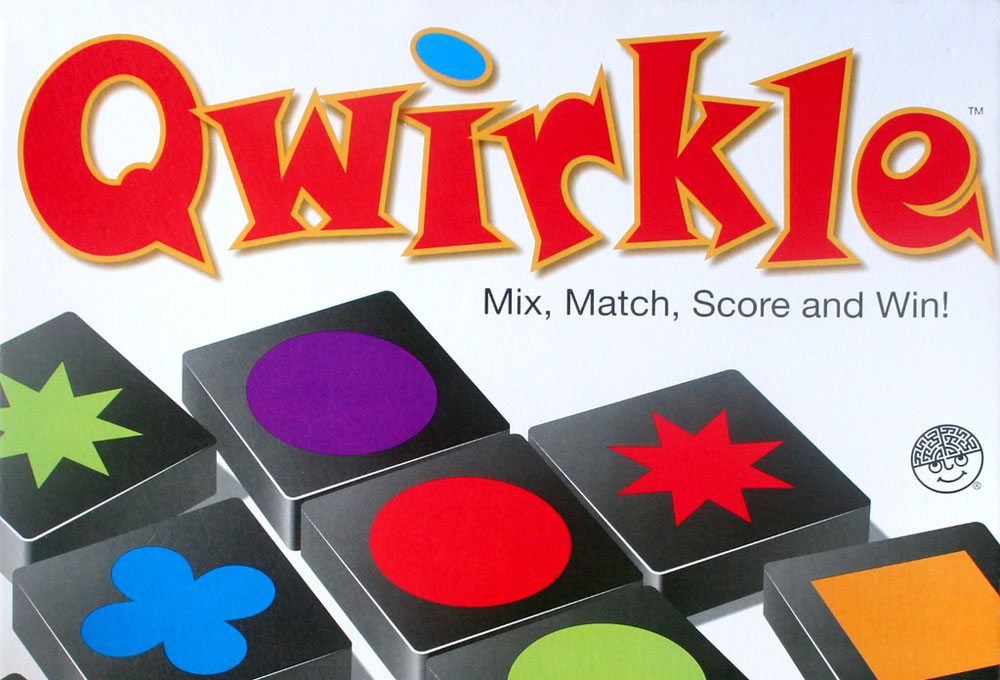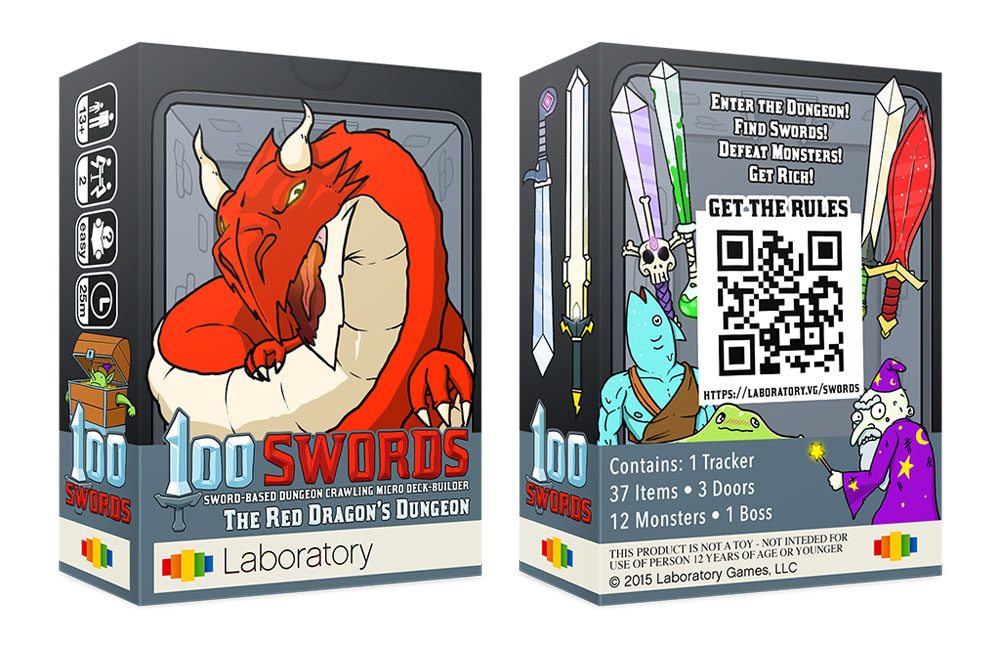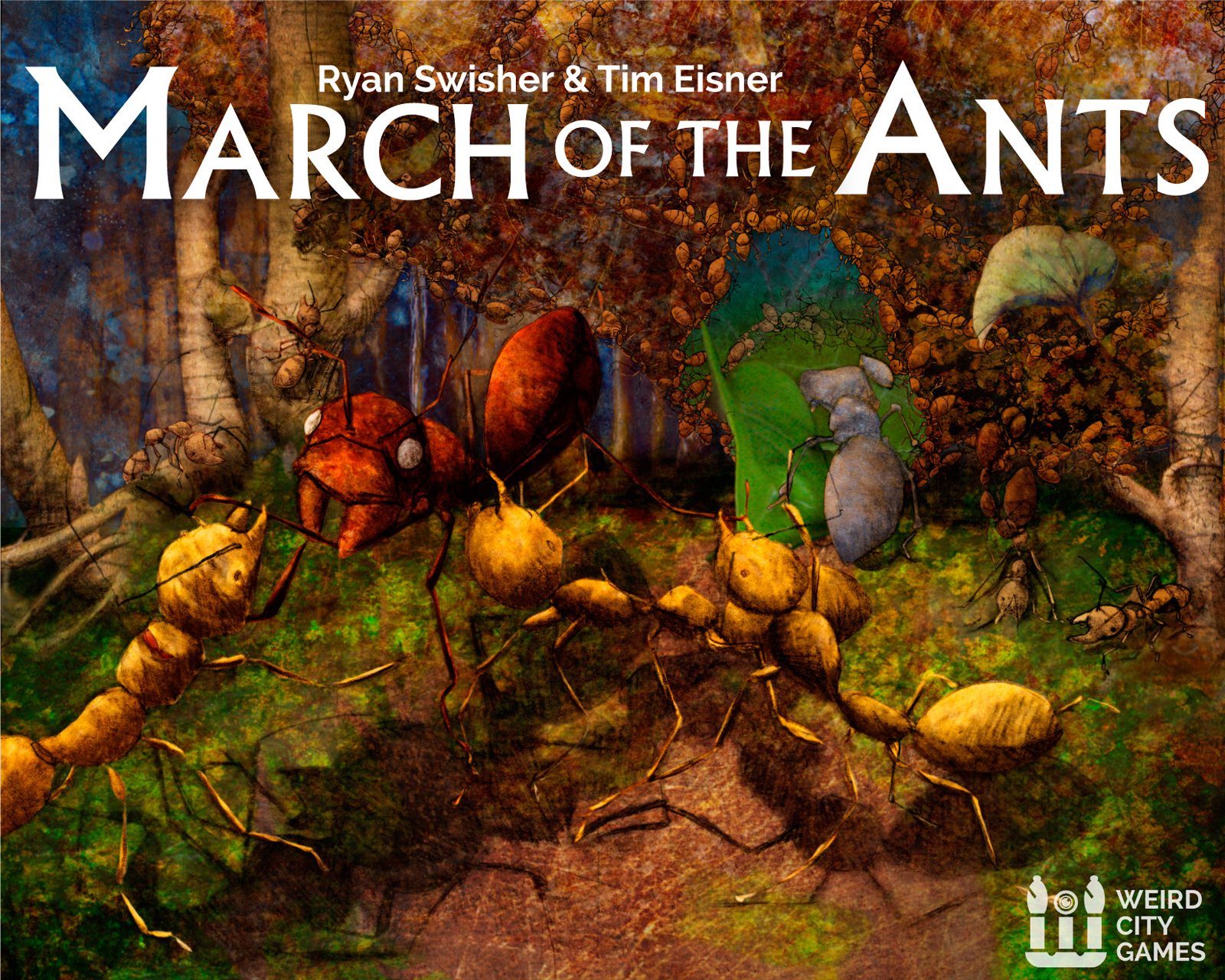Today I’ve got a recap of Bristol-Liu Con 2015, which took place last week in Portland, Oregon. You probably hadn’t heard about it–it’s a brand-new event and attendance was fairly limited. But there were lots of games involved.
Last week fellow GeekDad writers Jenny and Rory Bristol came up to Portland for a visit, and we had an impromptu mini-convention. We hit some of the usual tourist spots like Multnomah Falls and Powell’s Books, had some awesome donuts and ice cream, and stopped in at Billy Galaxy to marvel at the collection of vintage toys and posters and comic books. We even had a hands-on workshop to make temari.

And, of course, no convention is complete without board games. Lots and lots of board games.
I don’t often get the chance to play games with most of the GeekDad writers, since most of us are spread out all over the place. I’ll see a few of them maybe once or twice a year at something like Gen Con. So I was pretty excited to hang out with the Bristols to find out what types of games they liked and share some of my favorites.
Here’s a really quick zip-through of the games we played. A lot of these will get the full review treatment later, once I’ve caught up on some sleep!
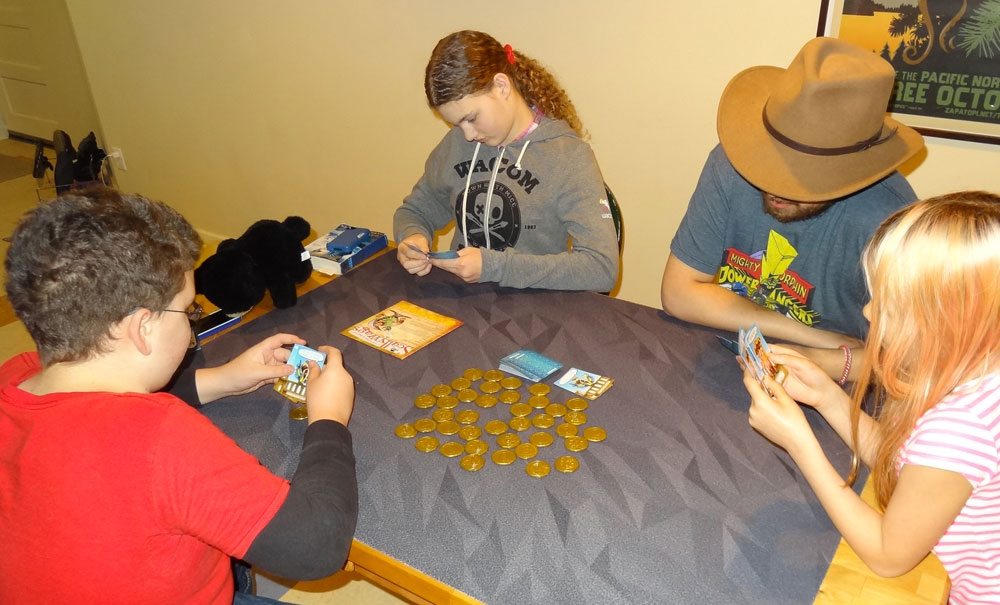
Scallywags
I reviewed this get-the-gold game a few years ago, and since it was one everyone was familiar with, we played it a couple times to warm up. It’s a fun, light game that kids can play, but for more experienced players I now prefer Dread Curse for a game that shares the theme and some mechanics but has a little more depth to it.

Flip City
This micro-deck-builder has Taiwanese origins, from Moaideas and Homosapiens Lab, and Tasty Minstrel Games is bringing it to the US this year. It’s a fantastic game that uses an interesting twist–the cards are double-sided, and you can pay to flip them over, upgrading them and giving you additional abilities. Expect a full review closer to its release date, but I will mention that after playing this, Rory and Jenny immediately preordered it online. You can too!

Paperback
I reviewed Paperback when it was on Kickstarter, and Dave Banks picked it as one of his favorite games of 2014. It’s a deck-building, word-making game, and it’s just done really well. We played this a couple times over the week, and it’s another one that ended up on the Bristols’ wishlist. We did throw in some of the variants, and it’s definitely a game I could play a lot more of without getting tired of it.
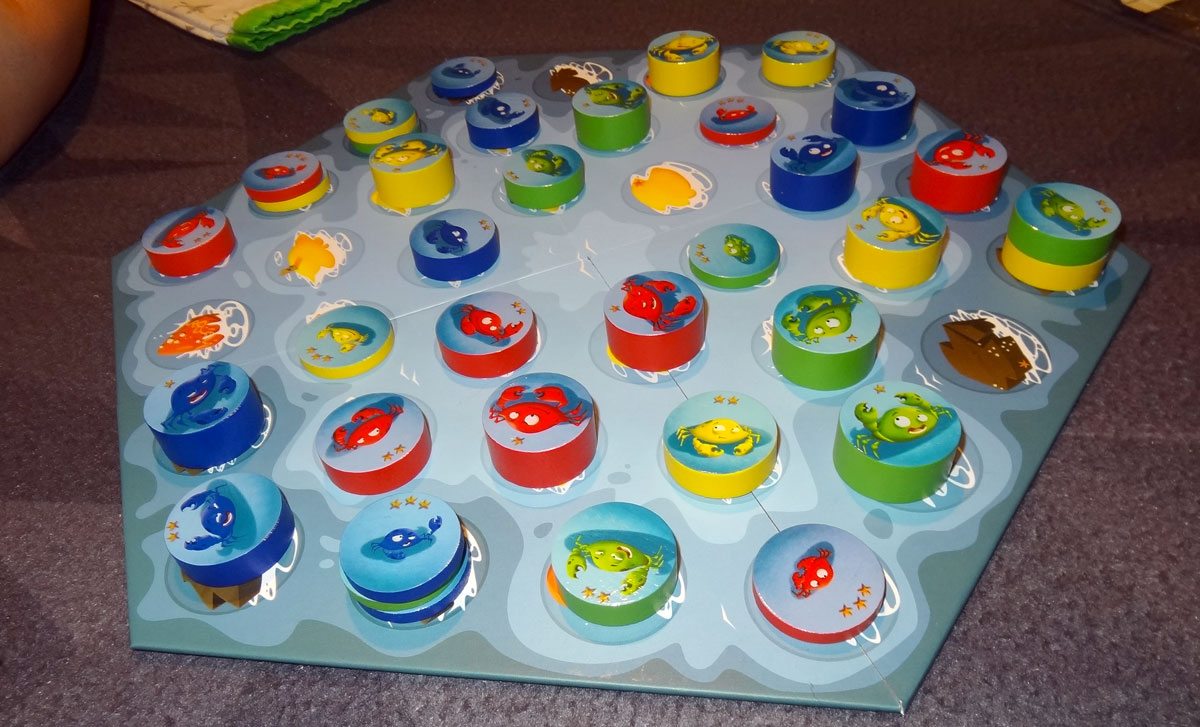
Crab Stack
The nice thing about reviewing games is that playing games counts as “work,” so several of the games on the list were ones I needed to review. You can read my review of Crab Stack, a strategy game from Blue Orange Games that involves stacking up crabs so they don’t get washed away by the tide.
Qwirkle
Qwirkle is another older game–sort of like Scrabble with shapes and colors. I’d picked up a copy in a math trade after playing it with some friends, and it’s a nice casual game.
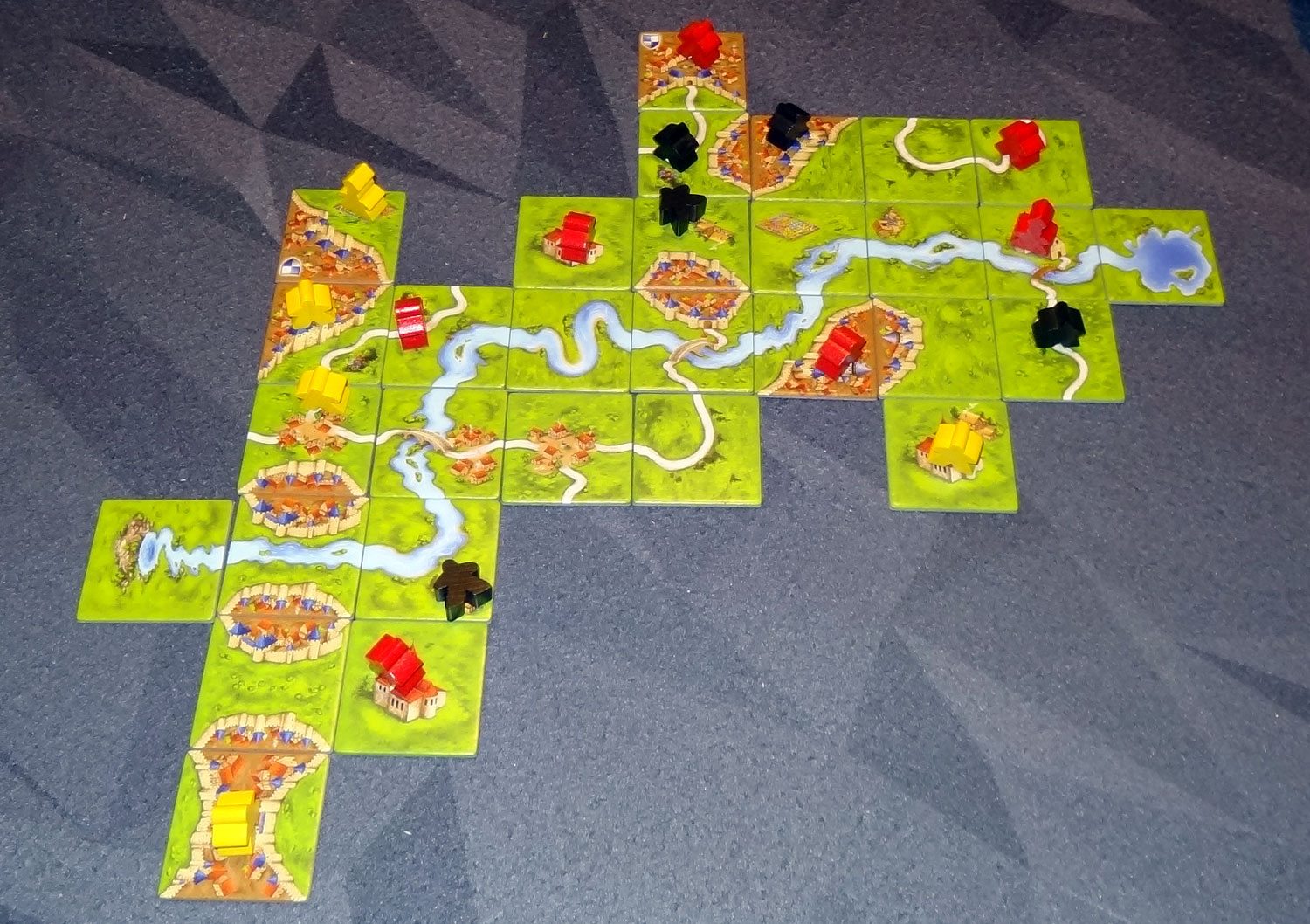
Carcassonne
I did get one game of Carcassonne in as well, just the base game rules with the River thrown in. (The photo above is the 2.0 version with the Abbot because I forgot to get a picture.) Still one of my all-time favorite games, whether it’s on the table or the tablet.
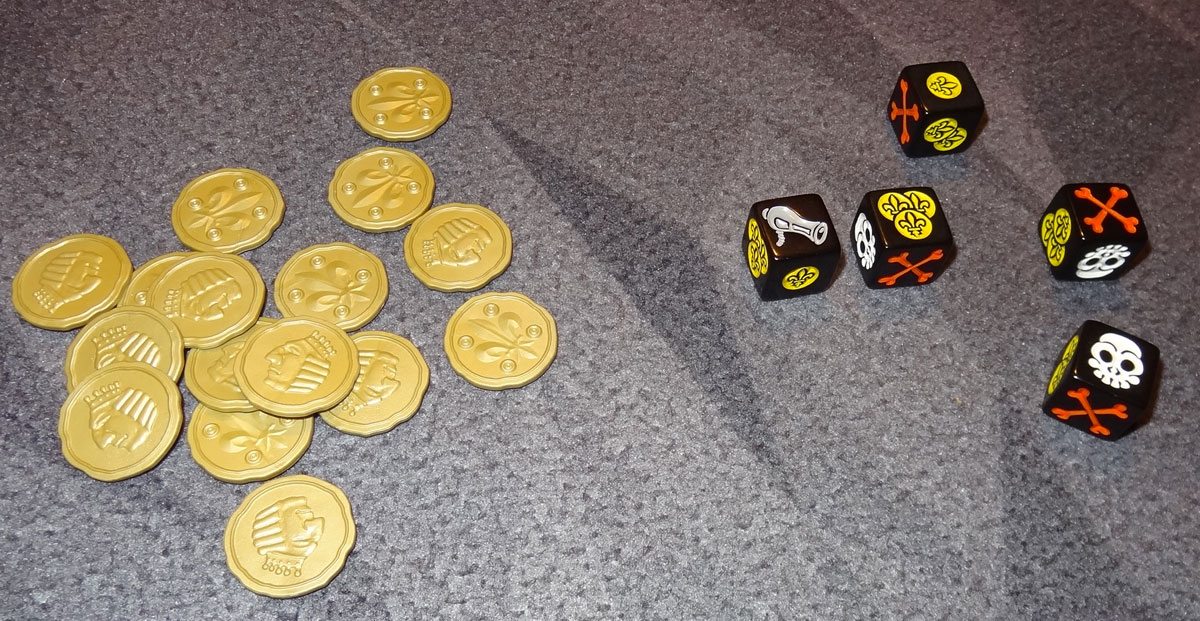
King’s Gold
This is another upcoming game from Blue Orange Games (expect a review next week) that’s a little bit Yahtzee, a little bit Zombie Dice, and a lot of gold. It’s light, but does offer a little more variety and player interaction than Zombie Dice, so I like it.
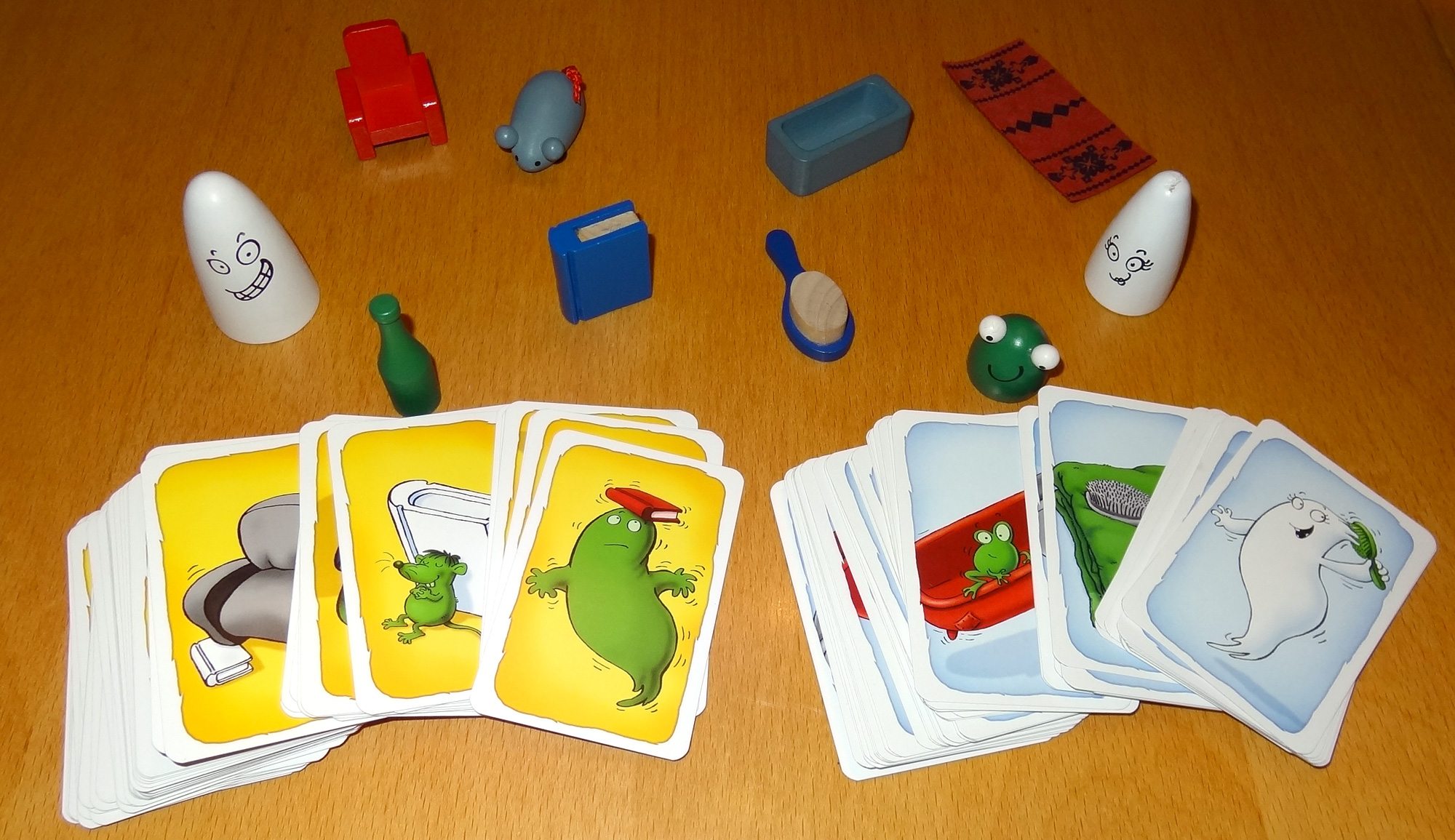
Ghost Blitz
Ghost Blitz is a quick little game I picked up in Taiwan, of all places, but you don’t have to go that far to get your own copy. It’s a game about fast perception and reminds me a little of games like SET or even the recently-reviewed Color Clash. We played a couple times as a filler game.

Roots
Here’s a little word-making game that uses prefixes and suffixes formed into “trees” on the table. You try to make words that match the current subject card, and then there’s a vote to see whose word gets the card. It funded on Kickstarter last fall and has since delivered, and I got a review copy to try it out. The game has some potential but the rulebook needs some clarification, so I’ll have to try this one again.

Marrying Mr. Darcy
Jenny is a big Jane Austen fan, so of course we had to play Marrying Mr. Darcy (which I reviewed last year). Sadly, she discovered that sometimes you don’t actually get to marry Mr. Darcy. The references to the story are a lot of fun, but you don’t always get a lot of choices in what to do–though perhaps that mechanic accurately reflects the situation of the characters you’re playing.
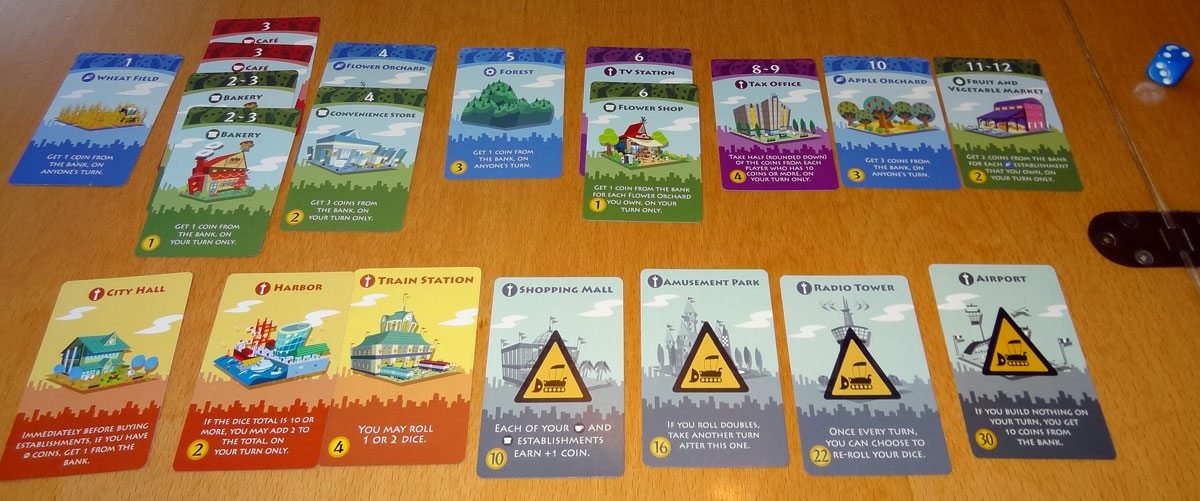
Machi Koro
We played a few games of Machi Koro over the weekend, usually with the Harbor expansion included. This is one that Rory really enjoyed but Jenny wasn’t keen on the attack cards. We did try our own variant without all the attack cards, but it unbalances the game a bit. Still a family favorite, and I like that the expansion mixes up your strategies a bit, even if there’s more random chance introduced. There’s another expansion coming soon, so I’m excited to see what’s included.

Evolution
We played Evolution a couple of times over the week, and the kids got it out and played a few times by themselves, too. It’s a game about creating species and adding traits to them so you can compete for food (or become carnivores and attack other species). I liked the game already (as you might know from my review of the initial Kickstarter and the more recent campaign for the expansion), but I’m still thrilled each time I play by how rich it is. Even the last time we played, another player came up with an effective combination of traits that I hadn’t seen before. Just a really solid, great game.

Battle Sheep
I’ll admit–the first time I saw the box for Battle Sheep, I figured it was going to be a silly game without much to it. I was pleasantly surprised. It’s actually a very nice abstract strategy game (with a silly theme, yes) that showed definite replay value. I’ve played this several times with kids, adults, and both together, and the kids took it and played it constantly over the weekend. Expect a review of this one soon, but it’s definitely worth trying if you like abstract strategy.
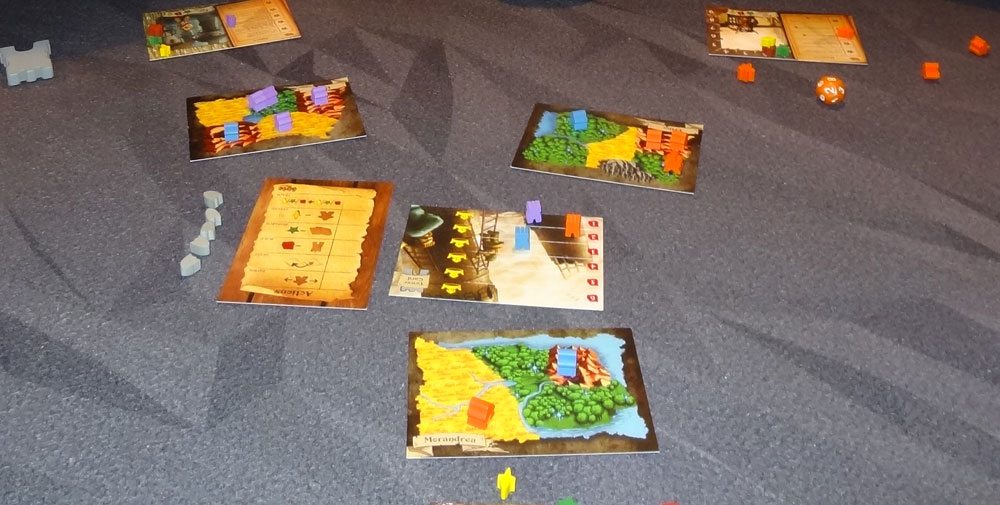
Tiny Epic Kingdoms
One of the things we did over the week was help define various terms: what sort of games qualify as “worker placement,” how would you categorize this particular game, etc. I showed Rory Tiny Epic Kingdoms as an example of a game that combined several mechanics–action selections, area control, resource management. It’s not the sort of game that Jenny enjoys as much, but Rory and I enjoyed it. (You can read my original review of the Kickstarter here.)

Tiny Epic Kingdoms: Heroes’ Call
I’d gotten a prototype of the Heroes’ Call expansion to Tiny Epic Kingdoms (the Kickstarter launches later this month), so I figured after we played the base game it would be nice to try the expansion. It adds heroes to the mix, so each player has one meeple that has special abilities. There are some other new features as well, but I’ll tell you more about those in the full review later. Suffice to say, it adds some fun variations to the base game, and we really enjoyed this one, too.
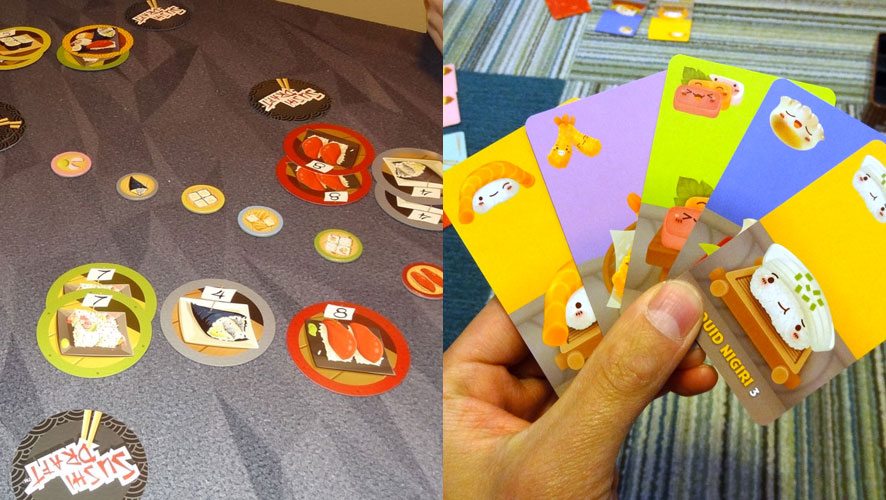
Sushi Draft vs. Sushi Go!
So I actually have two card drafting games about sushi: Sushi Draft is an upcoming release from Blue Orange games (expect a review later this month), and Sushi Go! was published last year by Gamewright (my original review is here). We played them back-to-back, and they actually are different games, despite the similar theme and primary mechanic. In both, you’ll pass cards around, taking out the sushi that you want to “eat” each turn. Sushi Draft seems to have a simpler ruleset but scoring is hidden and includes some random chance. Sushi Go! has more complicated scoring but allows for deeper strategy.
100 Swords
Laboratory, which also published the 2-player micro-Eurogame Province, has an upcoming release called 100 Swords. It’s a tiny deck-building game about a dungeon crawl. I played this one just once so far and it’s pretty cute. It’s fairly easy to learn and I’ll have to give it some more plays to see how the strategy develops after knowing the sorts of cards in the deck.

Lanterns: The Harvest Festival
I reviewed Lanterns when it was on Kickstarter last year, but I hadn’t broken in my finished copy yet. Jenny was particularly interested in trying it because it had just been announced as one of this year’s Mensa Select titles. It’s a tile-laying game where you collect lantern cards and turn in particular sets for points. One of the fun things is that you get to collect cards during everyone’s turn, so it keeps you engaged even when it’s not your turn. We played this a couple times, too.
March of the Ants
Here’s another Kickstarter game that I reviewed previously. It’s now finished and has been delivered, and Rory was really interested in trying it out. There’s a lot going on in March of the Ants, which puts you in charge of an ant colony, competing to evolve your ants and compete for territory. Since Jenny was less interested in some of the heavier games, I invited a couple of my regulars over and this is one of the games we played that evening.
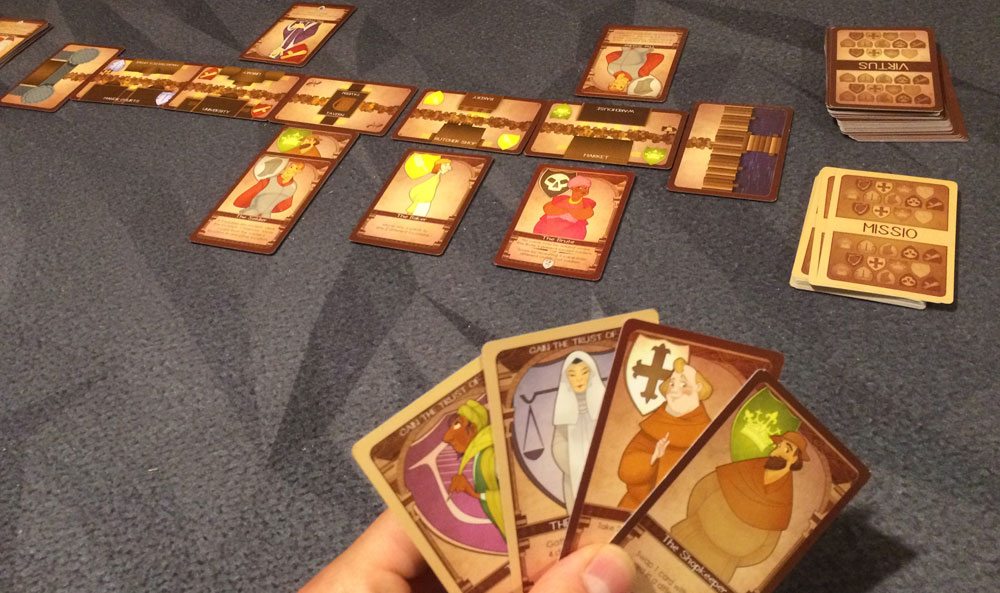
Fidelitas
This small-box game funded on Kickstarter last year, and I played the finished version for the first time with Jenny and Rory. You send characters to the various locations on the table, using their actions to manipulate the people in the town, and then score points by getting particular combinations of people into the right places. The game also includes some variants and a little expansion that adds some extra characters that can score points as an ability.
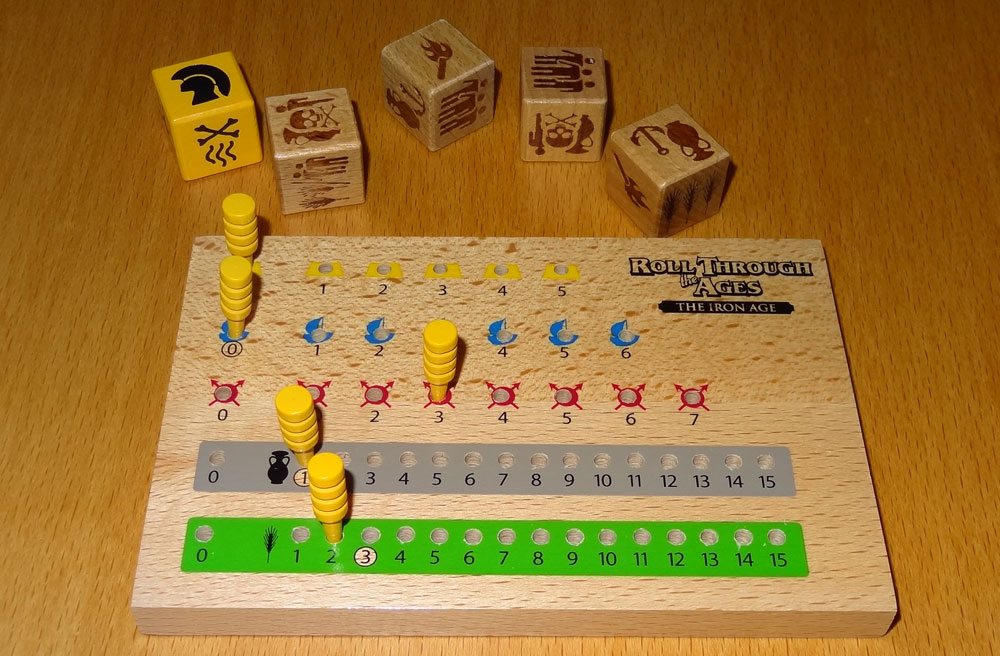
Roll Through the Ages: The Iron Age
I’m a fan of the original Roll Through the Ages, which I reviewed several years ago. It’s like civilization building and Yahtzee, designed by Matt Leacock (of Pandemic fame). The new version brings us from the Bronze Age to the Iron Age, and includes some new advancements, different types of resources, and the new Fate die. There’s also an included Mediterranean expansion but we didn’t get to that one yet. I really like it even though I came in last place both times we played. Expect a review of this one later, too.
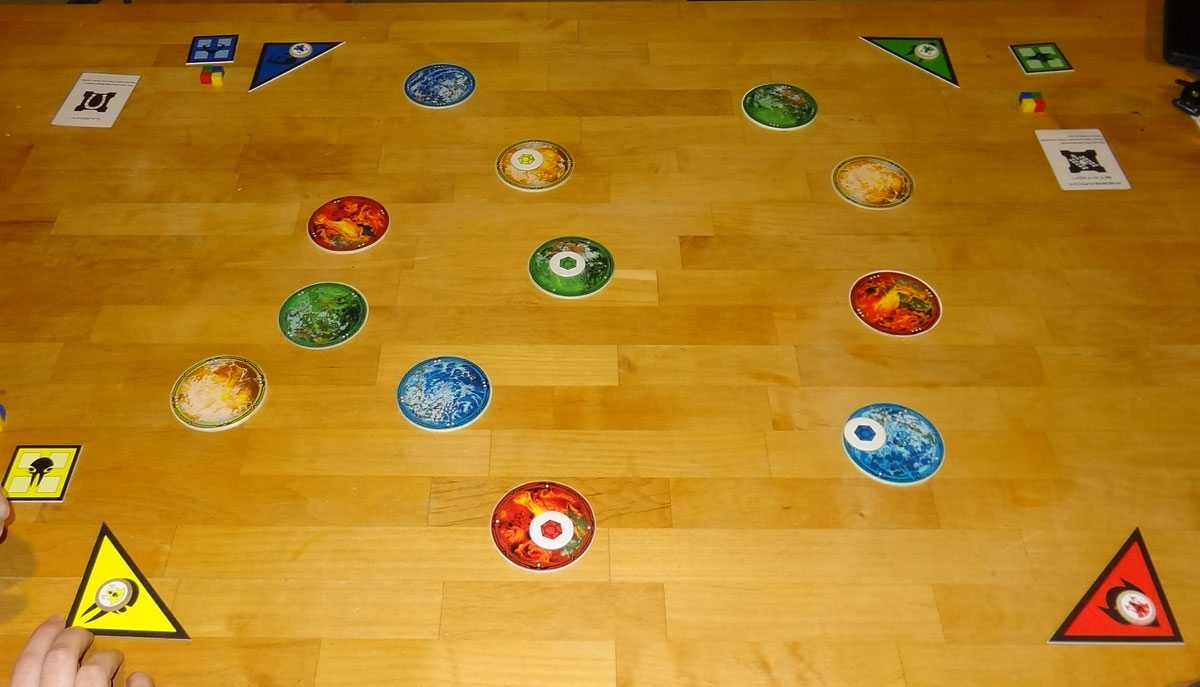
Cosmic Kaboom
I just reviewed Cosmic Kaboom earlier this week for its Kickstarter launch. It’s a flicking game about collecting resources and destroying planets. Some people (me) love dexterity games and some don’t care for them. Jenny and Rory hadn’t played very many so I figured we could try this out and see what they thought. The rules could use some clarifications, but the game itself was fun.
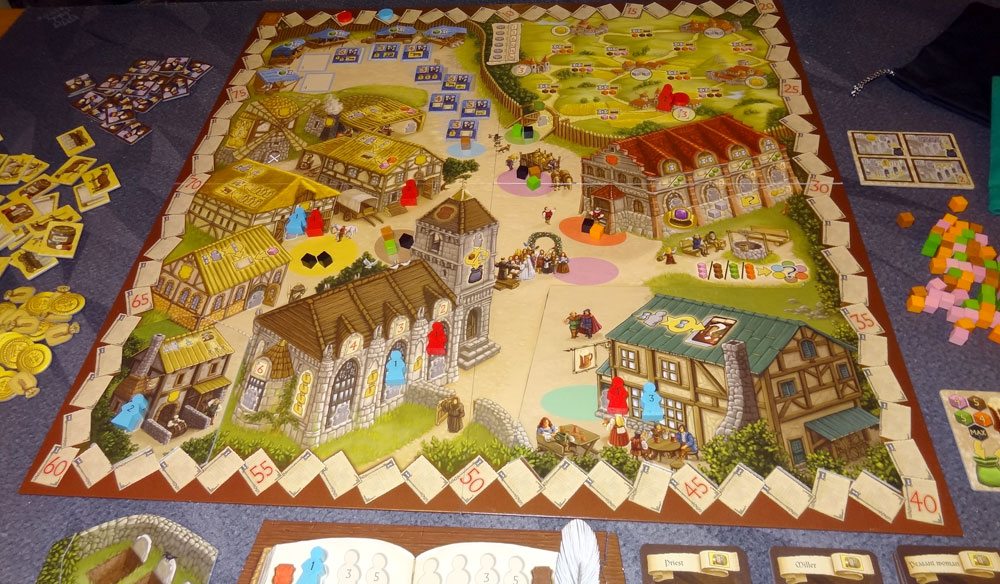
Village and Inn expansion
Village won the Kennerspiel des Jahres in 2012, and I really haven’t played it as much as I should. It’s a heavier game, so Rory and I played a two-player game, and the next day threw in the Inn expansion. It’s a fascinating game about life in a little village: your family can craft things, sell things at market, go to church, travel, or join the council. But perhaps the most interesting thing about the game is that time is a resource–every time you use 12 time, one of your family members dies. Playing this reminded me what a great game it is, and also that I should really write up a review.
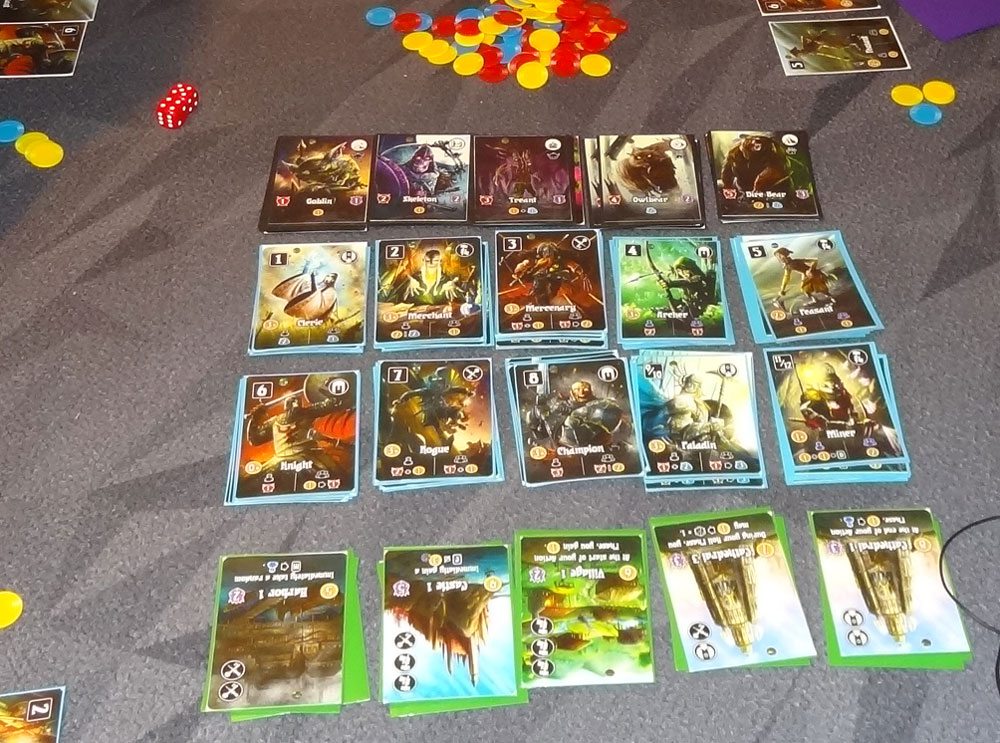
Valeria: Card Kingdoms
One of the perk of gaming at the House of Liu is that you get to play games that aren’t released yet. (And, I suppose, sometimes one of the downsides of gaming here is that you’re forced to play games that aren’t finished.) After playing Machi Koro, I thought that Jenny and Rory would also enjoy Valeria because it uses some similar mechanics. (It was on Kickstarter earlier this year and is still in production.) They both enjoyed it, even though Jenny wasn’t a huge fan of the monster-fighting theme.

Loop Inc.
While the Bristols were here, I got two time-travel games in the mail on the same day. We only got to try one of them (but if I get my time machine working we’ll go back and play the other one the same day, too). Loop, Inc. is an upcoming game by Scott Almes that has you taking clients to famous events, then going back in time to the beginning of the day and doing it again. Incorporating your old moves with the new moves each day is quite complex, but I had fun. Watch for the Kickstarter later this month.
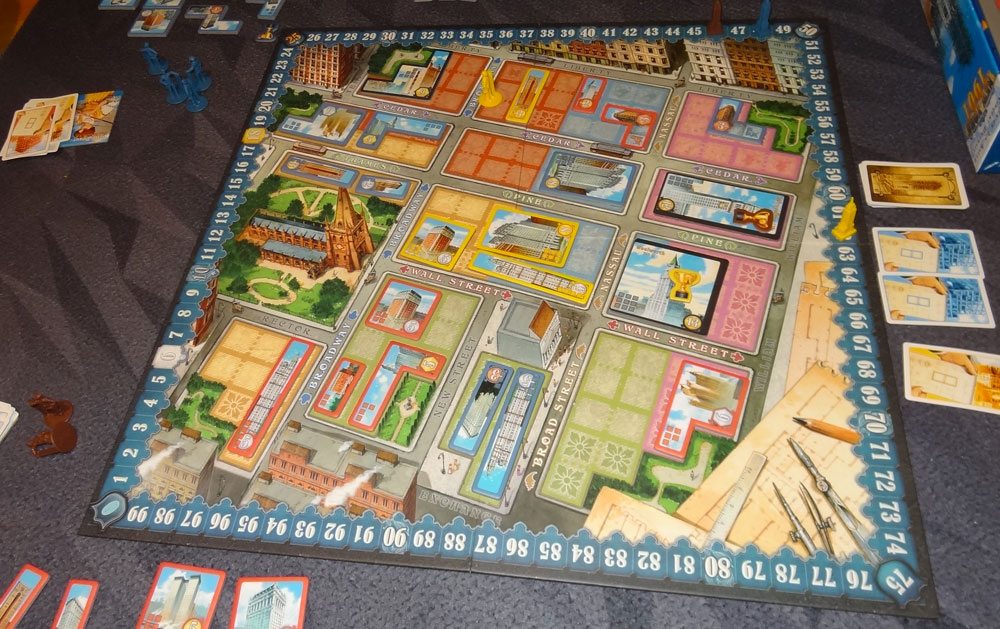
New York 1901
This one is Blue Orange Games’ first “heavy” title, and it’s about building skyscrapers. You acquire lots and stake them out with your workers, build up your skyscrapers, and then demolish and rebuild even bigger. We only got to play the simpler introductory game, but I’m hoping to try the full version soon. The game will be released in July, so I’ll try to have a review closer to that time.

Tsuro of the Seas
The last day, when the Bristols were supposed to be packing and getting to bed early so they could hit the road early the next day, we couldn’t resist playing just one more game. And then one more time. We ended Bristol-Liu Con with a couple plays of Tsuro of the Seas, a tile-laying game where giant monsters roam the seas and wipe out tiles (and players) as they go.

All in all, it was a pretty fantastic week of gaming. Sure, we didn’t get to go to Origins, but I got about 40 plays in over the course of the week and had a whole lot of fun. I’m already looking forward to Bristol-Liu Con 2016!
Disclosure: Some of the games mentioned in this post were provided by the publishers for review purposes.

